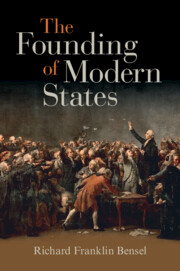‘This magnificent study of political beginnings, democratic and not, is a stunning work of analytical history and political theory. By illuminating the charged and often contradictory dimensions of popular sovereignty and elite leadership, legitimacy and belonging, social purpose and institutional invention, ideology and consent, governing rules and state capacity, sovereign decisions and regime limits, The Founding of Modern States profoundly reshapes understanding.'
Ira I. Katznelson - Professor of Political Science and History, Columbia University
‘In this magisterial work, Richard Bensel demonstrates how the founding of modern states, whether putatively democratic or non-democratic, inescapably involves mythologizing political identities and authority in order to craft senses of common purpose to guide governing institutions. His analysis generates a wealth of sobering insights into the sources of our enduring political challenges.'
Rogers M. Smith - Professor of Political Science, University of Pennsylvania
‘In a sweeping analysis of the originary moments of modern states, Richard Bensel unpacks the dilemma of sovereignty, showing how necessary founding rituals manage the thorny simultaneity of membership, leadership and rules. Spanning four centuries and three continents while linking political philosophy to institutions as no other scholar quite could, Bensel teaches us that even democracies are birthed from moments that are non-democratic.'
Daniel Carpenter - Professor of Government, Harvard University
‘Bensel sheds important new light on both the nondemocratic and chimerical features that shape the contours of modern states.’
Mark Dincecco
Source: Perspectives on Politics
‘Bensel’s idiosyncratic but compelling new book … puts a generous helping of historical and analytical meat by sequentially taking up six foundings: England (from ‘time out of mind’ through the Glorious Revolution of 1688), the USA (1774–89), France (1789–94), the Soviet Union (1917–18), the Third Reich (1933), and the Islamic Republic of Iran (1979). Each of these discussions is a miniature education in statecraft, rich with detail and full of conversation with authors from Hume to Arendt to contemporary historians and political scientists …’
Philip A. Wallach
Source: Law and Liberty
‘Richard Bensel … rejects the truthfulness of any founding narrative and suggests that if one were to make public the dishonesty of one’s own country’s founding myths, it would be heretical … Perhaps most unsettling is Bensel’s warning that one cannot truthfully study one’s own founding without committing something akin to heresy-a provocation with which many on the political right might well agree.’
Barry Shain
Source: American Political Thought



